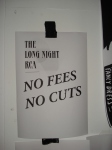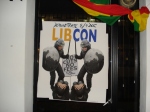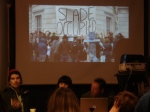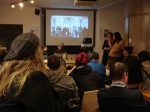Interesting feedback from Jonathan Stuart-Brown of Save the British Film Industry.com
“Thesis, anti-thesis, synthesis leads to a better arts set up in the UK and maximises the chance of creative talent being unleashed.
Assetion. Counter-assertion and challenge. Conclusion. Repeat the process. Free, fair, fearless debate.
It is NOT about the name of the quango or the quango office. It is all about the honesty, morality and patriotism of the person in the office and the aggregate group think.
The arts quango industry in the UK has been corrupt to a staggering level for decades but not scrutinised by the real police, the media or nominal watchdogs (often big recipients of public money from those who they were meant to police).
People in The Arts industry do steal, cover up, embezzle, fiddle expenses in a way which an MP would blush, have side companies alongside public money administration jobs where A gives public money to B who gives public money to A.
Literally hundreds of millions have just been stolen or misappropriated…and no consequences as it is “art”.
The more the quangos and level of bureaucracies, the harder it is for anyone without a huge attention span and zeal for research to follow. The less scrutiny, the fewer consequences, the greater the corruption.
The Department of Culture is lazy, inept, clueless. Truly imbecilic. Gone are the days top intellects, hard workers and well informed wise people worked in The Department.
The Select Committee could – sadly – put on a farce at The West End without any script other than the evident lack of knowledge, insight, research they display in every Committee hearing.
People lie to them without challenge or consequence.
The media takes no notice as it is only mysterious art…and too complicated or boring to follow the money.
Far far far too much depends on personal honesty and integrity in arts quangos from people who learned very bad habits from the others in the industry who do not administer public monies with a straight bat.
Private monies, private patronage…do what you want.
Public monies…administer with great honesty and do not use to self-enrich to enrich family, friends, your own in club.
The only way to achieve the latter in an ever dishonest industry is to ring the changes every two years with people who have handed out public money in arts then prevented from doing so again for five years. It stops the cliques forming.
We could even hand out all public monies via libraries and Youtube pitches with each library volounteer team voting YES or NO. This guarantees wide BIG SOCIETY participation. Not corrupt deals in the dark.
The film industry only exists in the south-east because there are sound stages (the thing which really bring in the billions in inward investment) in west London and part of North London. 300 acres controls the inward investment and a small in club cabal actively lobbies to stop sound stages being built on the literally 200 000 plus acres in the regions which people can not give away. These could become state of the art sets such as sci-fi, pyramids, ancient Rome, Paris, Venice, Amsterdam, New York, Moscow, North Pole, Beijing, medieval castle, jungle etc. These can double as tourist theme parks.
We could have a regular 250 000 people employed in the film industry across the UK and £25 billion a year annual turnover.
However a small cabal wants to prevent it – and the power shift from west London – and regardless of what quango is in power, the cabal is always pulling the strings to stop sound stages being built around the UK.
When sound stages are built around the UK, so the film industry will spread around and lead all private investment in arts, music, culture. But the very quangos set up to achieve it have been staffed by people trying to prevent it.
London would gain in absolute terms but LOSE in relative terms as other regions rose and closed the gap.
Instead of grabbing this point, Jeremy Hunt and David Cameron prefer to build a needless train set for £30 billion which they can not play with until 2025.
It is not cuts…as some cuts cut out corruption and cancer, they remove articles.
It is personal morality, true UK wide participation and ethos, and breaking up the in-clubs.
The public monies should be spent on physical infrastructure which attracts inward investment…sound stages and sets around the UK.
But as The Government is truly clueless on this, THEN it is time to pray and pray hard. It will take a miracle.









